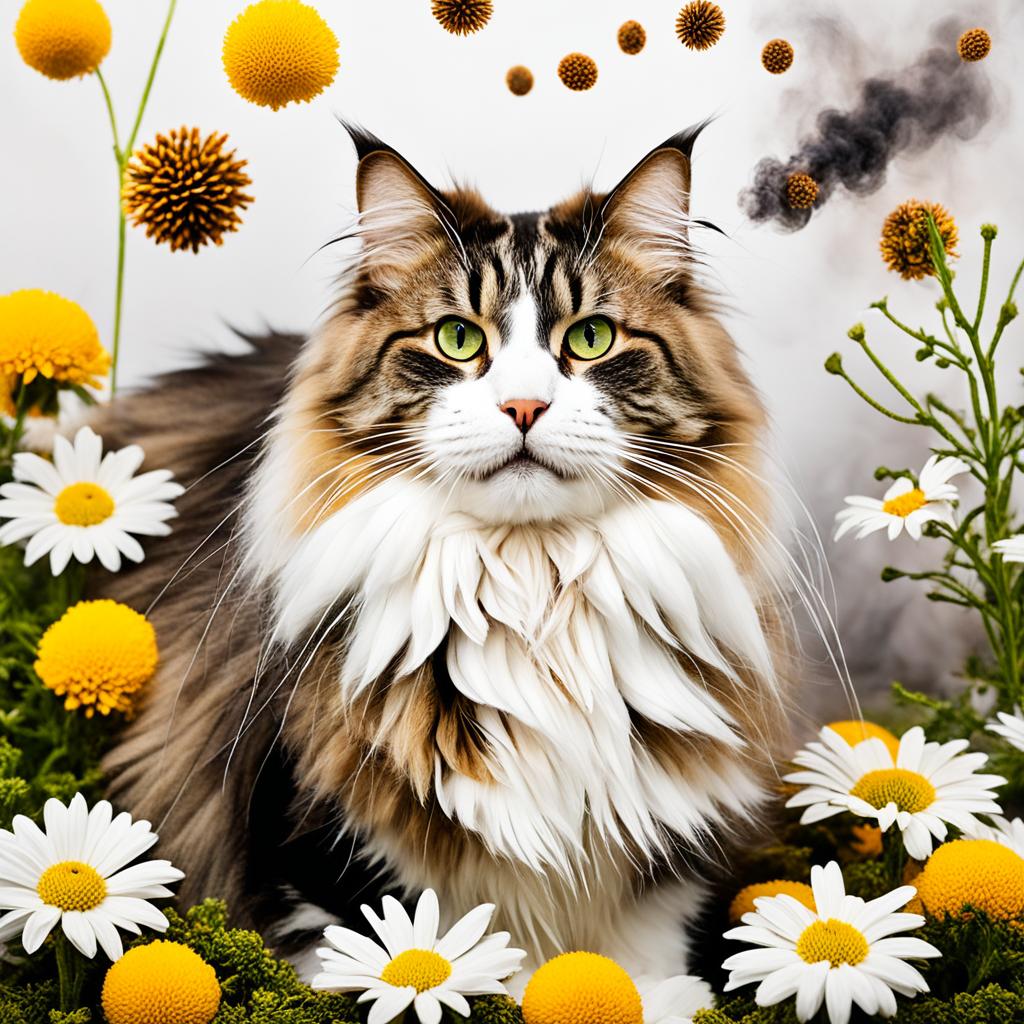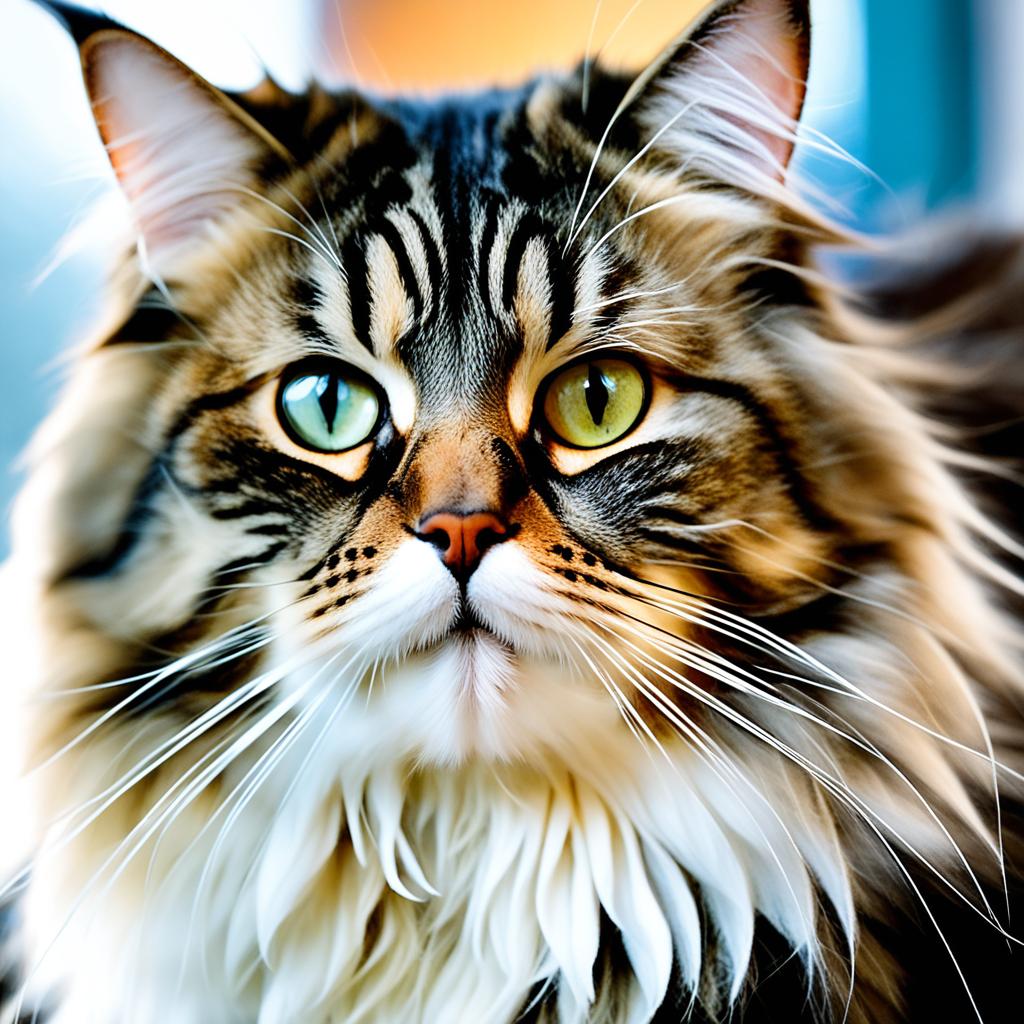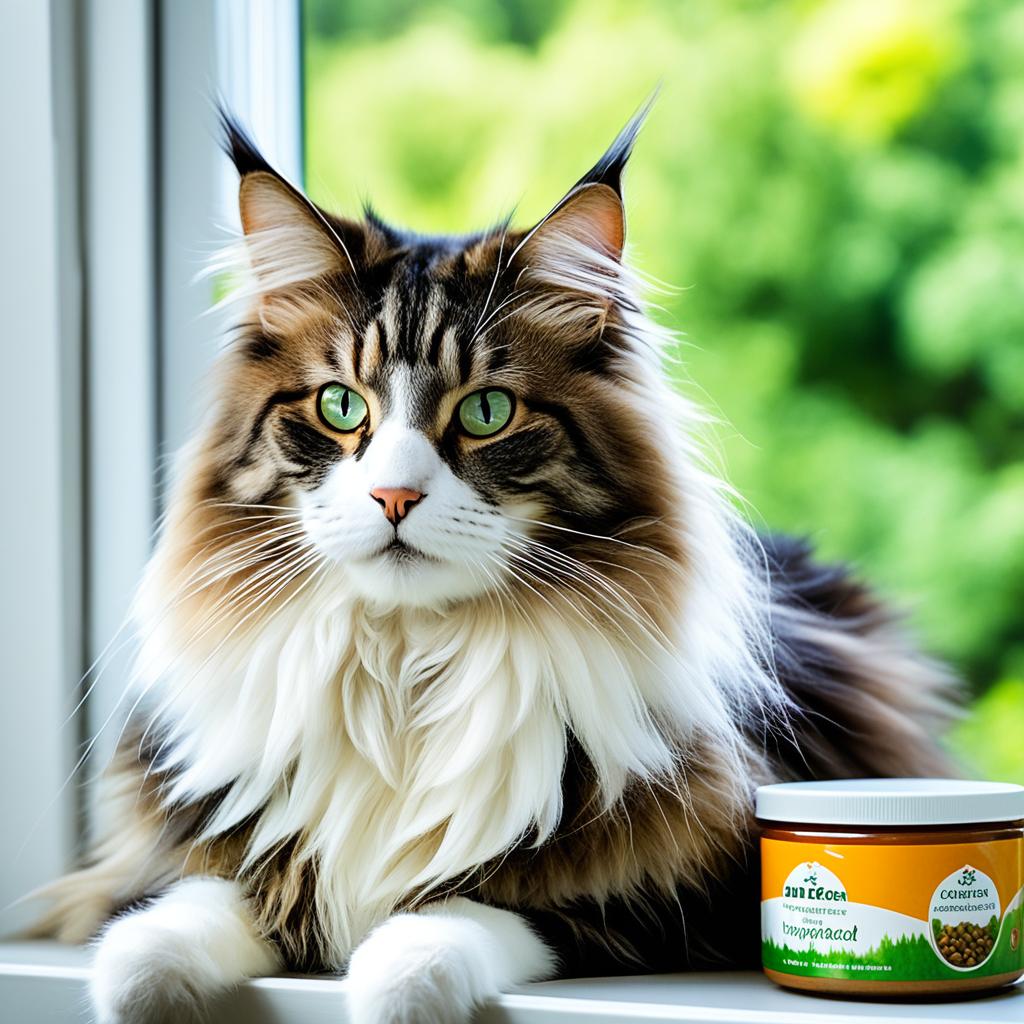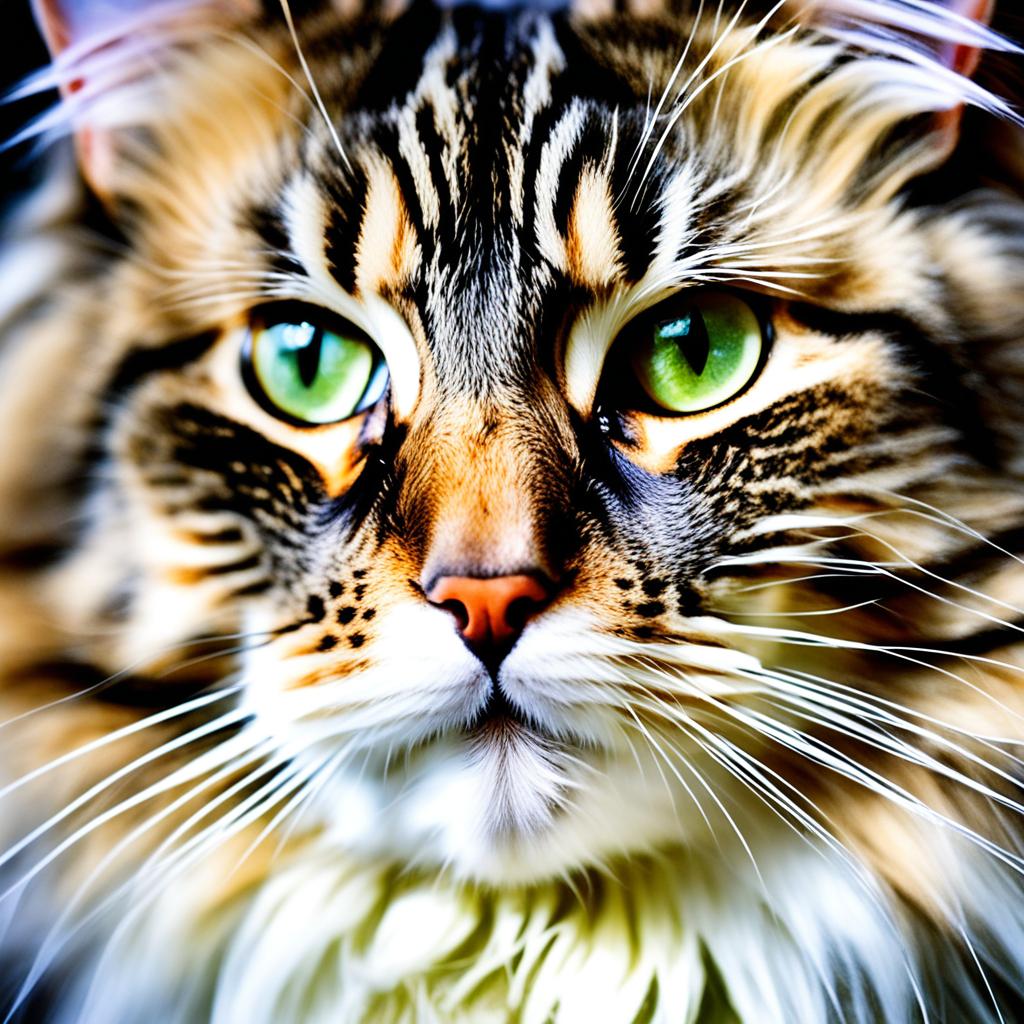Have you ever wondered why your seemingly healthy Norwegian Forest Cat suddenly bursts into a sneezing fit? Although a solitary sneeze might appear entertaining, frequent sneezing could indicate something more significant. From respiratory infections to environmental irritants, there’s a broad spectrum of reasons that could be causing your furry companion’s frequent sneezing. Understanding these factors is crucial for providing quick relief and ensuring your cat’s well-being.
Key Takeaways
- Occasional sneezing in Norwegian Forest Cats may be benign.
- Frequent sneezing can signal underlying issues like infections or allergies.
- Sneezing is a reflex meant to expel irritants from nasal passages.
- Common causes include Feline Herpesvirus 1, Feline Calicivirus, and environmental allergens.
- Identifying and addressing the cause is important for your cat’s overall health.
Now that you’re aware of the potential causes, let’s delve deeper into why your Norwegian Forest Cat might be sneezing and what you can do to help.
Understanding Why Your Norwegian Forest Cat Sneezes

Noticed your Norwegian Forest Cat sneezing frequently? Sneezing can be a symptom of several underlying issues, from common viruses to environmental irritants. Understanding the cat sneezing causes is essential for providing the right care and ensuring your feline’s comfort.
Common Causes of Sneezing
When your cat sneezes, it might be responding to the need to clear nasal irritants such as dust and pollen. However, when sneezing becomes frequent, it could be indicative of more serious health problems. Among the most common cat sneezing causes are upper respiratory infections and allergens.
Upper Respiratory Infections
Your cat’s sneezing could be linked to upper respiratory infections often caused by viruses. Notorious for causing sneezing and nasal discharge, feline herpesvirus (FHV-1) can be a primary culprit. Besides this, feline calicivirus is another frequent viral invader leading to respiratory issues.
Allergens and Irritants
Can your feline friend be allergic to something in the environment? Absolutely! Common allergens affecting cats include pollen, dust, molds, scents, and smoke. These allergens can trigger sneezing fits. Besides, foreign objects lodged in their nasal passages and even dental issues may also initiate sneezing episodes.
| Cause | Symptoms | Treatment |
|---|---|---|
| Feline Herpesvirus | Sneezing, nasal discharge, conjunctivitis | Antiviral medications, supportive care |
| Feline Calicivirus | Sneezing, oral ulcers, fever | Supportive care, anti-inflammatory drugs |
| Allergens | Sneezing, itching, watery eyes | Eliminate allergens, antihistamines |
What to Do If Your Norwegian Forest Cat Is Sneezing?

It’s concerning when your beloved Norwegian Forest Cat starts sneezing. Understanding what to do if your Norwegian Forest Cat is sneezing can help you address the issue promptly and ensure your feline friend stays healthy.
Immediate Steps to Take
First, assess the frequency and context of the sneezing episodes. Are there particular times of the day or specific rooms where your cat sneezes more often? These patterns can be crucial indicators of potential environmental triggers. Additionally, make sure you’re not confusing sneezing with other behaviors such as coughing or retching.
- If the sneezing persists, try capturing a video. This can be extremely helpful for your veterinarian to make an accurate assessment.
- Take note of any other symptoms such as nasal discharge, coughing, or behavioral changes.
Monitoring Your Cat’s Symptoms
Monitoring cat health is essential when dealing with sneezing episodes. Utilize a cat health tracker to log the frequency of sneezing and any accompanying symptoms. A comprehensive health log can provide valuable insights to your veterinarian.
Remember, if the sneezing becomes frequent, disrupts your cat’s daily activities, or you suspect a foreign object might be causing the issue, don’t hesitate to seek veterinary care immediately.
By diligently monitoring your cat’s symptoms and taking prompt action, you can effectively manage their health and ensure they receive the care they need.
Home Remedies for Sneezing Cats

When your feline friend starts sneezing, it’s not just a cute hiccup; it might signal that they need some extra care. Luckily, there are effective home remedies for sneezing cats that can make a significant difference.
Using a Humidifier
Dry air can be tough on your cat’s nasal passages. Using a humidifier in your home can help maintain optimal cat nasal health. This device adds moisture to the air, soothing those irritated nasal passages and mitigating sneezing caused by dryness.
Cleaning Your Cat’s Environment
Our homes can be a treasure trove of environmental allergens for cats. Regular cleaning reduces dust, mold, and strong scents, dramatically cutting down irritant-induced sneezing. Furthermore, be mindful of perfumes and scented cleaning products, which can exacerbate sneezing.
Vaporizer and Steam Therapy
For congestion relief, consider using a vaporizer or steam therapy. These methods help to moisten the nasal cavity, easing the breathing process for your cat. You can achieve this by letting your cat sit in a steamy bathroom for several minutes. This simple method works wonders, promoting better cat nasal health without the need for medications.
“Regularly implementing these home remedies ensures a happier, sneeze-free feline companion.”
For more comprehensive insights, here’s a quick comparison of the remedies:
| Remedy | Benefits | Application |
|---|---|---|
| Humidifier | Moisturizes air, soothes nasal passages | Use in the room where the cat spends the most time |
| Cleaning | Reduces allergens | Weekly deep cleaning, unscented products |
| Steam Therapy | Relieves congestion | Let the cat sit in a steamy bathroom |
Integrating these home remedies into your care routine can significantly improve your cat’s comfort and overall health.
When to See a Vet for Cat Sneezing

It’s not unusual for your Norwegian Forest Cat to sneeze occasionally, much like we do. However, knowing when to see a vet for cat sneezing can make a world of difference in maintaining your furry friend’s health. Observing the accompanying symptoms is crucial.
Frequent sneezing or sneezing interrupted by nasal or eye discharge could be a sign that something more serious is at play.
If your cat is displaying persistent sneezing cat symptoms, such as appetite loss, lethargy, or sneezing accompanied by blood, it’s time to seek veterinary care. A vet can diagnose if the sneezing is caused by infections, dental issues, or more severe conditions like nasal tumors or feline leukemia.
Here’s a quick guideline on when to see a vet for cat sneezing:
- Repeated sneezing without improvement over a few days
- Presence of nasal discharge or eye discharge
- Sneezing combined with a loss of appetite or noticeable lethargy
- Sneezing accompanied by blood or foul-smelling discharge
By identifying these signs early, you can ensure timely and effective treatment for your Norwegian Forest Cat, maintaining their health and comfort.
Preventive Measures to Keep Your Cat Healthy

Maintaining good health in your Norwegian Forest Cat is crucial to prevent sneezing and other ailments. Regular routines and preventive care play a significant role in warding off health issues that may arise. Embrace these measures to ensure your feline friend stays fit and healthy.
Regular Vet Visits
Regular vet check-ups are fundamental for cat health maintenance. These visits allow the veterinarian to detect and address potential health issues before they worsen. Early detection ensures your kitty stays in top shape and minimizes health disturbances that could lead to sneezing.
Vaccinations and Immunizations
Keeping up with cat vaccinations is key to safeguard against common viruses that can cause upper respiratory infections. These preventive shots are designed to bolster your cat’s immune system, making it harder for illnesses to take hold and preventing sneezing in cats.
Here is a comparison to help you understand the impact of regular vet visits and vaccinations:
| Preventive Measures | Benefits |
|---|---|
| Regular Vet Visits | Early detection of health issues, consistent monitoring of overall well-being. |
| Cat Vaccinations | Protection against common viruses, reduced risk of respiratory infections. |
For optimal cat health maintenance, also consider a balanced diet and a clean environment. These not only support overall well-being but also help prevent sneezing in cats by boosting their immune systems.
How to Help a Sneezing Cat Feel Better

When your Norwegian Forest Cat is sneezing, there are several ways to offer comfort and promote healing. By paying attention to their diet and environment, you can significantly contribute to improving your cat’s health. Ensuring they have a nutritious diet and a comfortable, stress-free environment goes a long way in supporting their recovery.
Proper Nutrition and Hydration
A key aspect of managing cat sneezing is providing balanced nutrition for sneezing cats. A high-quality diet rich in essential nutrients can boost your cat’s immune system, making it easier for them to combat the irritants causing the sneezing. Additionally, make sure they have access to plenty of fresh, clean water to keep them hydrated and help their bodies expel toxins effectively.
Creating a Comfortable Environment
Additionally, enhancing cat comfort can aid in reducing sneezing episodes. Creating a serene and cozy space for your cat involves eliminating loud noises and strong odors, as these can trigger sneezing. Opt for soft bedding and quiet resting places which can ease your cat’s discomfort and contribute positively to their well-being.
Consider using air purifiers to remove potential airborne irritants and maintain a clean environment to further support improving your cat’s health. By combining proper nutrition for sneezing cats with a calm setting, you can make a noticeable difference in your furry friend’s comfort and overall health.
Cat Sneezing Remedies: Over-the-Counter Solutions

When it comes to alleviating your cat’s sneezing fits, there are several over-the-counter remedies and natural supplements worth considering. These solutions, backed by veterinary advice, can provide effective relief without compromising your feline’s overall health and well-being.
Antihistamines and Decongestants
One of the most accessible over-the-counter cat sneezing remedies includes antihistamines, which are particularly useful if your feline’s sneezing is triggered by allergies. Always ensure you consult with a veterinarian before administering any antihistamines to determine the correct dosage and suitability for your cat. Decongestants, similarly, can alleviate symptoms by reducing nasal congestion, making it easier for your cat to breathe comfortably.
Natural Supplements
For a more holistic approach, consider natural relief for feline sneezing through supplements. Products like NHV Resp-Aid contain anti-inflammatory properties that support respiratory health, reducing irritations that lead to sneezing. Remember, while natural remedies can be beneficial, it’s crucial to use them under veterinary guidance to ensure they’re safe and effective for your furry friend.
Identifying and Addressing Allergies in Cats

Determining whether your Norwegian Forest Cat is sneezing due to allergies is crucial for finding relief. By effectively identifying common allergens, you can take steps to create a healthier, cat-friendly home.
Common Allergens
Knowing what might be causing your feline’s sneezing fits is half the battle. Common allergens include perfumes, smoke, and cleaning chemicals. If you suspect allergies, pay attention to what environmental factors your cat is exposed to and make note of any patterns in their sneezing.
Adjusting Your Household Environment
Making your home a haven for your cat involves reducing allergens for cats and creating a cat-friendly home. If allergens are identified, removing irritants or minimizing your cat’s exposure to them can offer significant relief. Consult a veterinarian for cat allergy identification and personalized advice on adjusting your home. Recommendations may include using unscented products or enhancing air quality.
Embarking on cat allergy identification can be enlightening, guiding you to a cat-friendly home where your furry friend breathes easy. By reducing allergens for cats, you’re investing in their well-being and ensuring they enjoy a healthier, sneeze-free life.
Conclusion
Navigating the sneeze saga of your Norwegian Forest Cat might seem daunting, but with the right approach, those nasal nuisances can be managed. Recognizing and addressing the underlying causes is paramount. Whether it’s employing home remedies, ensuring preventive care, or seeking timely veterinary intervention, taking these steps will go a long way in maintaining feline nasal health.
Always be observant of sneezing patterns and remain vigilant about possible allergens in your home. The tiniest irritants could be the culprits behind your cat’s sneezing episodes. Use a humidifier, keep their environment clean, and consider steam therapy to provide relief. If symptoms persist or worsen, don’t hesitate to consult a vet for professional guidance.
In short, employing effective Norwegian Forest Cat sneezing solutions and being proactive about their nasal health ensures that your whiskered companion enjoys a more comfortable, sneeze-free life. Remember, a little attention to detail and timely care can turn those sneezes into a thing of the past. Now, doesn’t that sound like a breath of fresh air for both you and your furry friend?
FAQ
Why is my Norwegian Forest Cat sneezing?
Sneezing in Norwegian Forest Cats can be caused by various factors including upper respiratory infections, allergens such as pollen and dust, or irritants like smoke and scents. It can also be due to foreign objects in the nasal passages or dental issues.
What home remedies can I use for sneezing cats?
Home remedies for sneezing cats include using a humidifier to add moisture to the air, keeping the environment clean to reduce allergens, using vaporizers or steam therapy, and ensuring a comfortable living space.
How do I monitor my Norwegian Forest Cat’s sneezing symptoms?
Observe the frequency and context of the sneezing. Note any patterns or accompanying symptoms like nasal discharge, coughing, or changes in behavior. Capture videos of the sneezing episodes for the veterinarian’s assessment if needed.
When should I take my sneezing cat to the vet?
You should see a vet if your cat sneezes frequently, if the sneezing is accompanied by symptoms such as eye or nasal discharge, loss of appetite, lethargy, or if there is blood or foul discharge from the nose. Persistent sneezing also warrants a vet visit.
What are the common causes of sneezing in cats?
Common causes include upper respiratory infections from viruses like Feline Herpesvirus 1 (FHV-1) and Feline Calicivirus, environmental allergens like pollen, dust, mold, and irritants like smoke or perfumes.
What immediate steps should I take if my cat is sneezing?
Ensure your home is clean and free of potential allergens or irritants, add moisture to the air with a humidifier, and monitor your cat’s symptoms closely. Avoid exposing your cat to strong scents or smoke.
Can over-the-counter solutions help with cat sneezing?
Over-the-counter solutions like antihistamines and decongestants may be recommended by a vet for treating allergies. Natural supplements with anti-inflammatory properties can support respiratory health if used under veterinary guidance.
How can I prevent my Norwegian Forest Cat from sneezing?
Regular veterinary check-ups, keeping vaccinations up-to-date, ensuring a clean and dust-free environment, and maintaining overall health through a balanced diet and plenty of water can help prevent sneezing.
How do I create a comfortable environment for a sneezing cat?
To create a comfortable environment, provide soft bedding in quiet resting areas, eliminate strong odors and loud noises, and ensure good air quality in your home. A stress-free environment can improve your cat’s well-being.
What should I know about allergies and sneezing in cats?
Allergies in cats can be triggered by common allergens such as perfumes, cleaning chemicals, smoke, and dust. Identifying and reducing your cat’s exposure to these can alleviate sneezing. Consult a vet to identify specific allergens and adapt your home accordingly.




